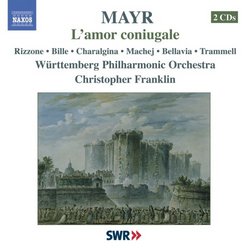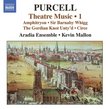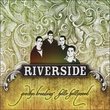| All Artists: Simon Mayr, Christopher Franklin, Wurttemberg Philharmonic Orchestra Title: Mayr: L'amor Coniugale Members Wishing: 0 Total Copies: 0 Label: Naxos Original Release Date: 1/1/2008 Re-Release Date: 3/25/2008 Genre: Classical Style: Opera & Classical Vocal Number of Discs: 2 SwapaCD Credits: 2 UPC: 730099019873 |
Search - Simon Mayr, Christopher Franklin, Wurttemberg Philharmonic Orchestra :: Mayr: L'amor Coniugale
 | Simon Mayr, Christopher Franklin, Wurttemberg Philharmonic Orchestra Mayr: L'amor Coniugale Genre: Classical |
Larger Image |
CD DetailsSimilar CDs
|
CD ReviewsBefore Beethoven; Another View of The Fidelio Story James S. Eisenberg | 03/31/2008 (4 out of 5 stars) "One of the most delightful discoveries of the Bel Canto Revival has been Donizetti's teacher, Giovanni Simone Mayr, a German born composer who lived most of his life in Bergamo, Italy. Without being a revolutionary, he nonetheless advanced the harmonic language of Italian opera, taking it from Classicism to Romanticism. He looks back to Gluck, Haydn and Mozart, but was a major influence on Rossini, Bellini, Donizetti and even the young Verdi.
His telling of the FIDELIO story, which predates the Beethoven work by several months, is straightforward, deeply sincere and musically lovely. Much smaller scaled than the Beethoven, it has no chorus, but otherwise follows the same plot line very closely, although names are not the same and the action is moved to Poland. Like Beethoven there are very large and similarly structured arias for Zeliska (the Leonore character), Amorveno (The Florestan character) and there is a "gold" aria for Peters. Although Mayr has often been accused of using too much coloratura in his vocal writing, here, that is kept tightly in check with vocal lines of almost Gluckian simplicity. Mayr is no Beethoven, but he succeeds admirably. When the timings for the current performance first appeared on line, I assumed that there were cuts, as this is at least fifteen minutes shorter than the private recording of the first modern revival(London 1973). As it turns out, it is simply played much faster. The result emphasizes the buffo elements more than the serious ones. (The piece was described by composer and librettist as a "Farsa Sentimentale")The casting is perhaps appropriately with much lighter voices than in the London revival. There is some fine singing here, but nobody really plumbs the depths of their characters, and one really wants darker voices for Zeliska and Amorveno. The live performance is very well recorded." |




